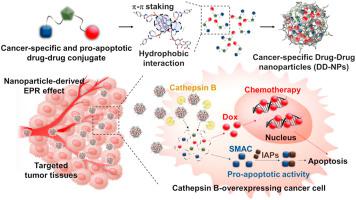Biomaterials ( IF 12.8 ) Pub Date : 2020-08-26 , DOI: 10.1016/j.biomaterials.2020.120347 Man Kyu Shim 1 , Yujeong Moon 2 , Suah Yang 3 , Jinseong Kim 3 , Hanhee Cho 1 , Seungho Lim 1 , Hong Yeol Yoon 1 , Joon-Kyung Seong 4 , Kwangmeyung Kim 3

|
Chemotherapy has shown remarkable therapeutic efficacy for various types of cancer. However, drug resistance reduces the effectiveness and sensitivity of chemotherapy, leading treatment failure and cancer relapse in many clinical indications. Herein, we propose cancer-specific drug-drug nanoparticles (DD-NPs) that improve the therapeutic efficacy of chemotherapy against drug-resistant cancer. Cancer-specific and pro-apoptotic drug-drug conjugate was prepared by conjugating the pro-apoptotic peptide drug (SMAC; Ala-Val-Pro-Ile-Ala-Gln, AVPIAQ) and cathepsin B-cleavable peptide (Phe-Arg-Arg-Gly, FRRG) to a doxorubicin (DOX), resulting in SMAC-FRRG-DOX that allows self-assembled into nanoparticles. The resulting DD-NPs were specifically cleaved to pro-apoptotic SMAC and cytotoxic DOX only in cathepsin B-overexpressing cancer cells, inducing a synergy of the pro-apoptotic activity with the chemotherapy. In MCF-7 breast tumor-bearing mice, intravenously injected DD-NPs highly accumulated at targeted tumor tissues via enhanced permeability and retention (EPR) effect, releasing SMAC and DOX, which showed a synergetic pro-apoptotic/chemotherapy. Furthermore, DD-NPs greatly suppressed tumor growth and improved overall survival in a metastatic lung cancer model. Collectively, these cancer-specific drug-drug nanoparticles may be a promising strategy to treat drug-resistant cancers with high cancer cell-specificity.
中文翻译:

促凋亡和组织蛋白酶B可裂解肽结合的阿霉素的癌症特异性药物纳米颗粒,用于耐药性癌症治疗。
化学疗法已显示出对各种类型癌症的显着疗效。然而,在许多临床适应症中,耐药性降低了化疗的有效性和敏感性,导致治疗失败和癌症复发。在本文中,我们提出了癌症特异性药物纳米颗粒(DD-NPs),该纳米颗粒可提高化学疗法对耐药癌症的治疗效果。通过缀合促凋亡肽药物(SMAC; Ala-Val-Pro-Ile-Ala-Gln, AVPIAQ)和组织蛋白酶B可裂解肽(Phe-Arg-Arg)制备癌症特异性和促凋亡药物-药物偶联物-甘氨酸(FRRG)转化为阿霉素(DOX),从而产生SMAC-FRRG-DOX,该SMAC-FRRG-DOX可以自组装成纳米颗粒。仅在过表达组织蛋白酶B的癌细胞中特异地将所得的DD-NPs裂解为促凋亡SMAC和细胞毒性DOX,从而诱导了促凋亡活性与化疗的协同作用。在MCF-7乳腺荷瘤小鼠中,静脉内注射的DD-NP通过增强的通透性和保留(EPR)效果,释放SMAC和DOX,这显示出协同的促凋亡/化学疗法。此外,DD-NP在转移性肺癌模型中极大地抑制了肿瘤的生长并提高了总生存率。总的来说,这些癌症特异性药物纳米颗粒可能是治疗具有高癌细胞特异性的耐药性癌症的有前途的策略。











































 京公网安备 11010802027423号
京公网安备 11010802027423号